Key takeaways
- Even failed corporate ventures can deliver long-term strategic value.
- Common failure points include poor product-market fit, internal misalignment, and lack of scalability.
- Successful teams use lean experimentation to validate, pivot, or shut down early.
- Lessons from failed ventures often fuel future wins within the parent company.
- Failure is not the end, it’s a powerful tool for innovation when leveraged correctly.
Why do so many corporate startups fail despite having funding, talent, and brand power?
Even with major advantages, corporate startups can still fall short. These corporate startup failures often stem from lack of product validation, internal misalignment, or market disconnect.
The good news? Even failed corporate ventures can be valuable—each one delivering lessons that shape stronger, more agile innovation strategies.
In this article, we’ll walk you through 10 failed corporate ventures from top global brands. Each case highlights key corporate venture lessons—from misjudging customer needs to underestimating operational challenges. These corporate innovation case studies show that even failure can be a step forward when the insights are applied effectively.
Let's gets started!
Example 1. Nike’s Adventure Club
Founded: 2019
Shut down: 2020
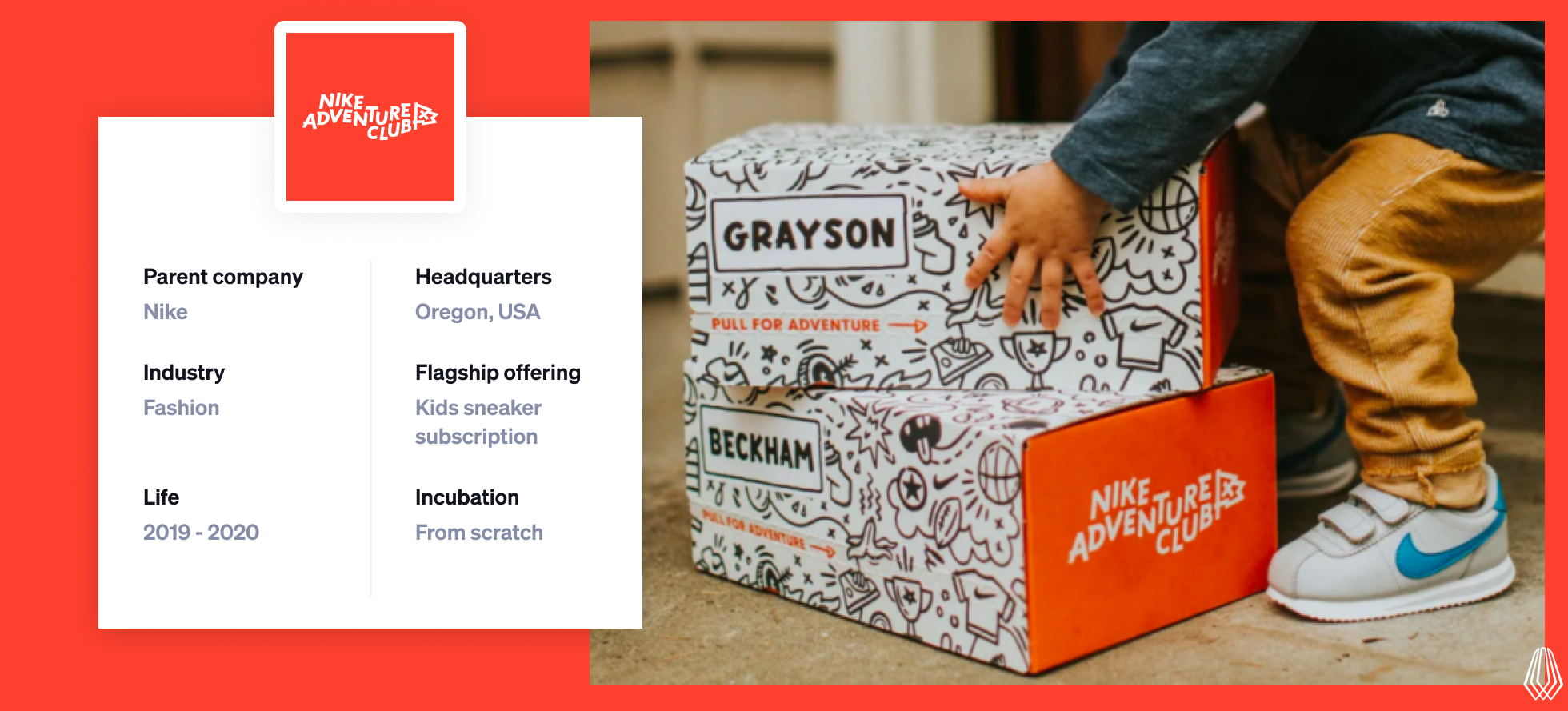
What was Nike Adventure Club, and why did it fail?
Nike Adventure Club was a D2C sneaker subscription service for kids that delivered Nike or Converse shoes right to the customer’s door throughout the year. It shut down after just one year due to limited scalability and lack of recurring demand.
Venture overview
The idea was to provide parents with an easier way to keep up with their children’s rapidly changing shoe needs (e.g. due to wear & tear or changes in shoe size). Each shoe delivery box was personalised with the child’s name and came with additional goodies like stickers, little gifts and activity guides that encouraged off-screen play.
The service offered three monthly subscription options, four shoe deliveries a year for $20, six pairs a year for $30, or twelve pairs a year for $50.
🚨 Corporate venture lesson
Even strong brand loyalty can’t replace the need for a scalable, sustainable business model.
Example 2. Walmart’s Jet Black
Founded: 2018
Shut down: 2020

What was Jet Black, and why did it fail?
Jet black was a concierge-style service enabled customers in the New York area to make orders from a substantial catalogue of options by text. It shut down due to high operating costs and challenges in scaling its personalised experience.
Venture overview
For $50 a month, customers in the New York area could text Jet Black’s AI-powered chatbot “J” and have their orders delivered that same day. Jet black was also the first venture to emerge from Store Nº8, Walmart’s corporate incubator, which was shut down in 2024.
🚨 Corporate venture lesson
Personalised services must be backed by cost-efficient, scalable operations.
Example 3. BuyRely by ING
Founded: 2015
Shut down: 2018
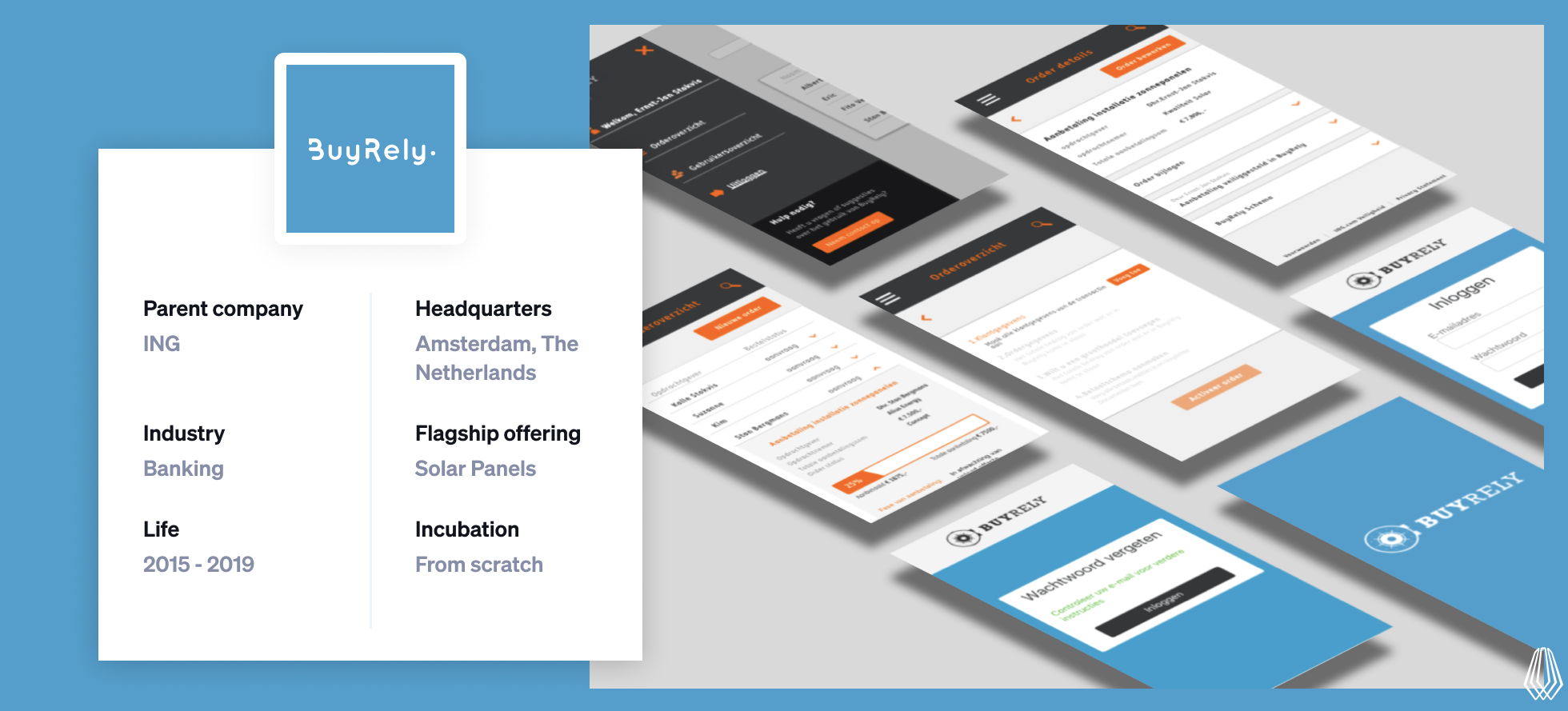
What was BuyRely, and why did it fail?
BuyRely was a payment platform to help customers finance solar panels. It shut down quietly after initial pilot success but lacked broader rollout and strategic backing.
Venture overview
BuyRely got its start when three ING employees (Ernst-Jan Stokvis, Martin Mastbroek and Annelies van Essen) entered the concept in ING’s 2015 internal innovation competition, ING Innovation Bootcamp. The team beat out over 1800 ideas with their promising concept.
The service was even recognised by the Dutch “Consumentenbond”, which mentioned the startup in their recommendations on buying solar panels.
🚨Corporate venture lesson
Internal validation needs to be matched with long-term business alignment and market readiness.
Example 4. Drinkfinity by PepsiCo
Founded: 2014
Shut down: 2020
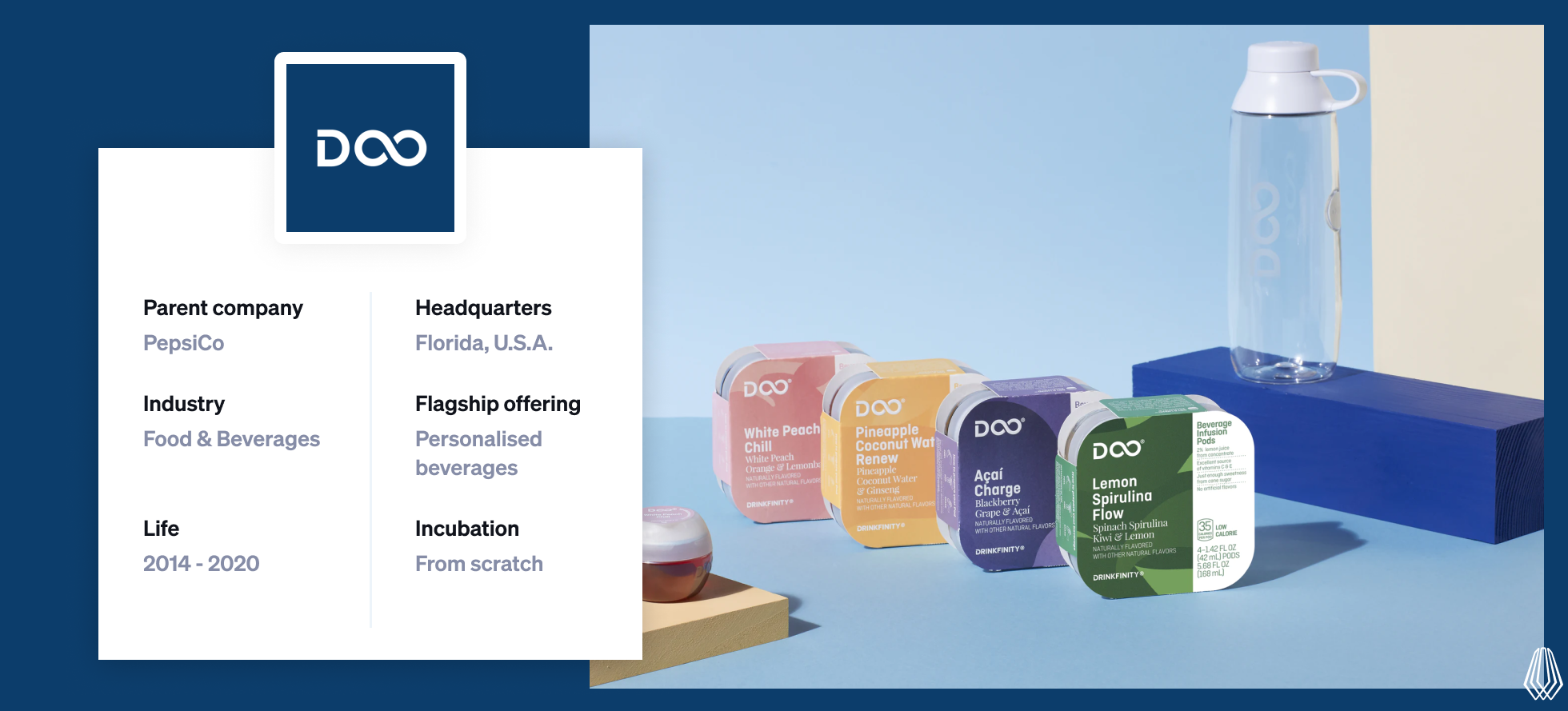
What was Drinkfinity, and why did it fail?
Drinkfinity was a personalised beverage system that used ingredient pods to enable customers to “peel, pop and shake” drinks in reusable containers. It was discontinued due to low consumer adoption and lack of sustained engagement.
Venture Overview
Depending on their needs, customers could choose from four options: “Charge” with green coffee extract, “flow” with vitamins C & E, “renew” with electrolytes, or “chill” with calming botanicals. Pods came in packs of four and retailed between $5 and $6. You could also purchase the Drinkfinity container for $20 at Drinkfinity.com.
The idea was to tap into growing consumer trends, like on-the-go consumption and the growing demand for healthier, more sustainable drink options. Despite eco-friendly messaging and personalisation, it failed to build long-term loyalty.
🚨Corporate venture lesson
Innovative products must solve a real, recurring consumer need to drive repeat use and retention.
Example 5. ApotheCARE Essentials by Unilever
Founded: 2017
Shut down: 2020
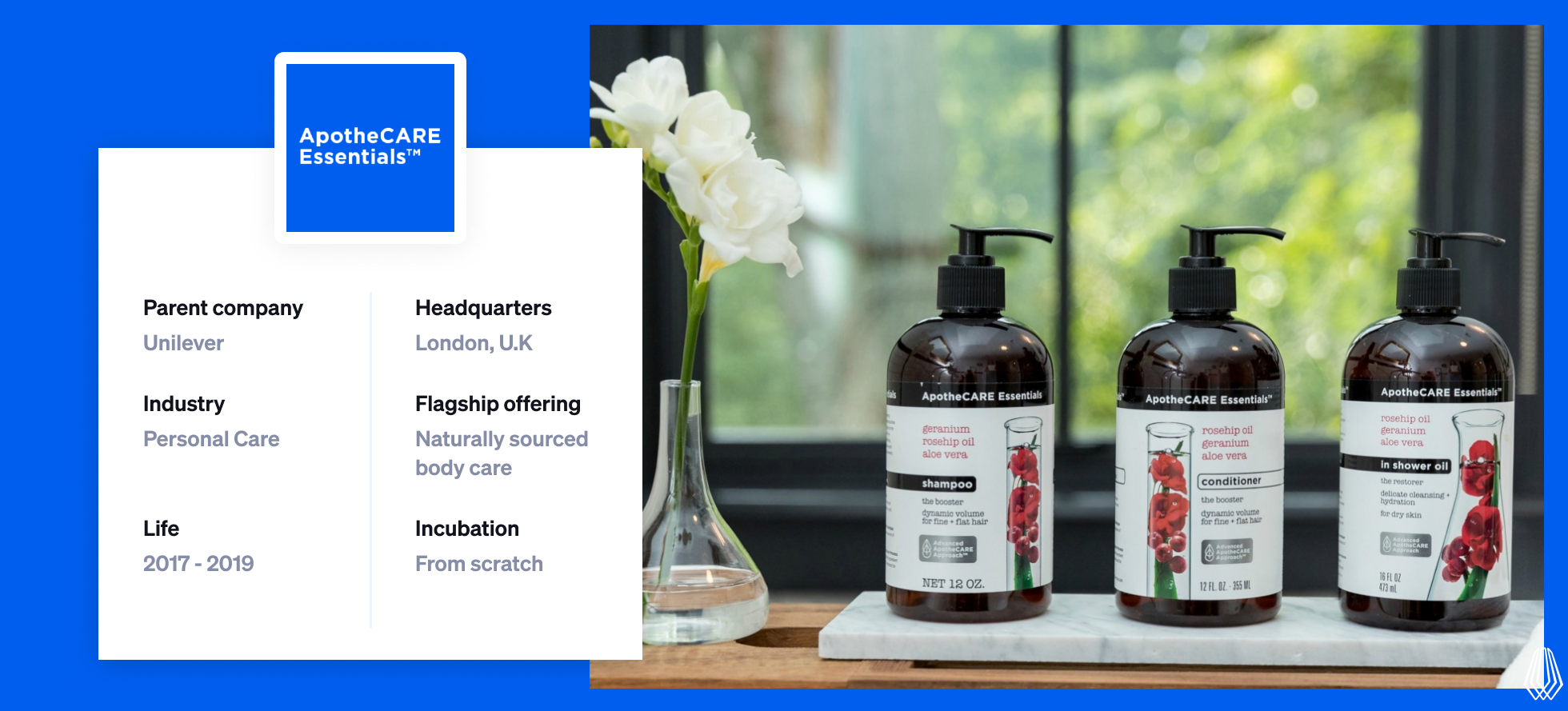
What was ApotheCARE Essentials, and why did it fail?
ApotheCARE Essentials was a beauty brand combining science and nature. It failed to differentiate in a crowded market and was phased out.
Venture overview
The brand made its debut in CVS and other select drug stores with products that retailed from $10,99 to $12,99. It used high-end apothecary-style packaging and natural-science positioning.
Although some ApotheCARE Essentials products are still available through retailers like Walmart or Amazon, the company’s website currently redirects to a Unilever hair care website.
🚨Corporate venture lesson
Differentiation and marketing clarity are crucial in saturated markets.
Example 6. NeoCare by Aetna
Founded: 2015
Shut down: 2018

What was NeoCare, and why did it fail?
NeoCare was a tablet-based app designed to support parents with children in the neonatal intensive care unit (NICU). It shut down due to limited adoption and the complexity of integrating with healthcare systems.
Venture overview
NeoCare enabled parents to connect with a registered nurse or social worker, known as a “NeoCoach,” and receive the help they needed during their NICU stay and as they settled back home.
President and Founder Dr. Jeffrey Jacques helped build the app after experiencing a NICU stay firsthand with his son in 2010.
🚨Corporate venture lesson
Emotional value must be paired with a clear path to market adoption and stakeholder integration.
Example 7. Ayem by Danone
Founded: 2017
Shut down: 2018
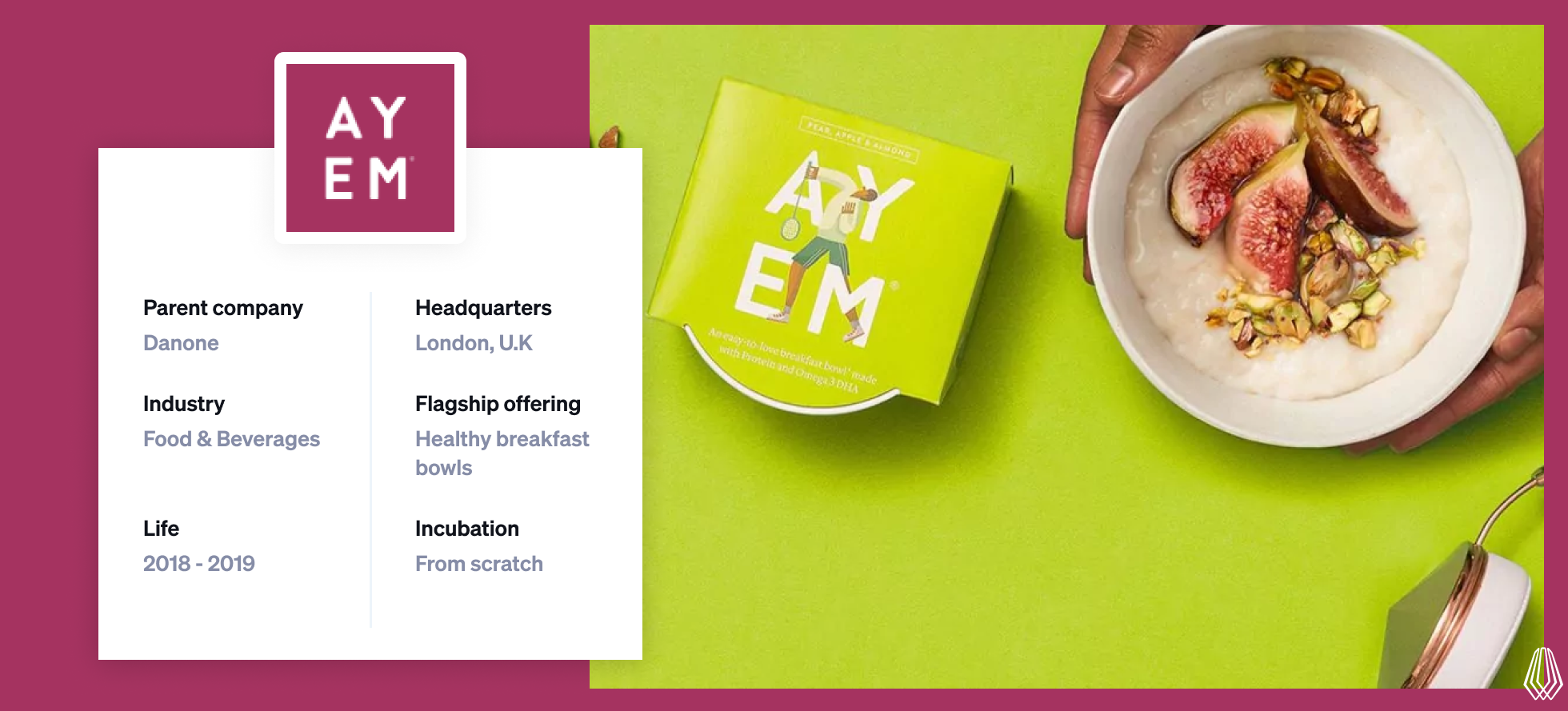
What was Ayem, and why did it fail?
Ayem was a high-protein breakfast product launched in London. It was discontinued after failing to gain enough traction for wider rollout.
Venture overview
Created through Danone’s internal accelerator (M.I.A.), Ayem included ingredients like whey protein, Omega-3 DHA, and Vitamin D. Despite a health-first concept, the product didn’t find its fit with consumers.
🚨Corporate venture lesson
Strong nutrition science and early buzz don’t guarantee mass-market appeal or longevity.
Example 8. Reco by Indigo
Founded: 2015
Shut down: 2018
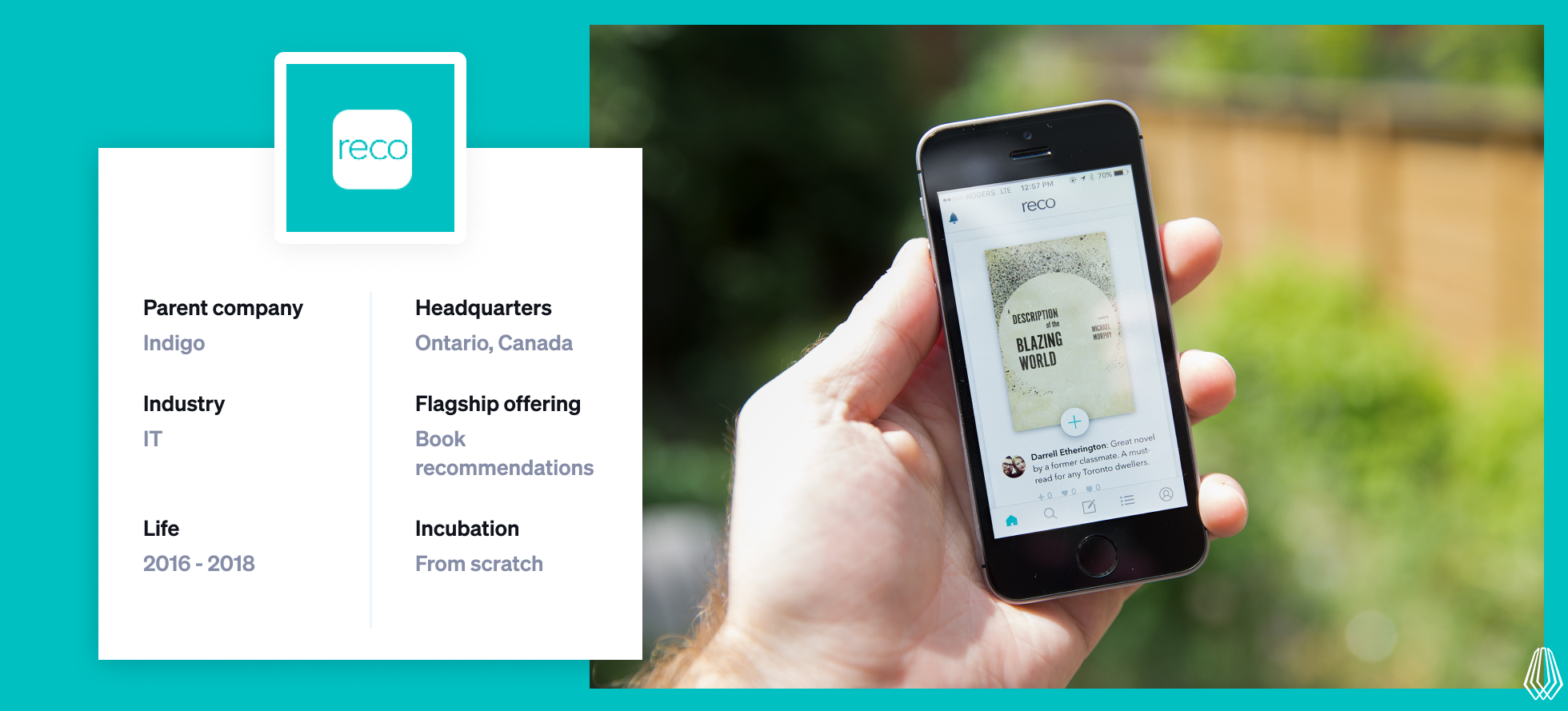
What was Reco, and why did it fail?
RECO app was a social book recommendation app. It shut down due to low user adoption and lack of marketing traction.
Venture overview
Reco allowed users to share and discover books through human-curated lists. It aimed to replace algorithm-driven suggestions with peer recommendations but never reached critical mass.
🚨Corporate venture lesson
Digital community-based ventures require consistent user growth and active engagement strategies.
Example 9. Loon by Alphabet
Founded: 2011
Shut down: 2021
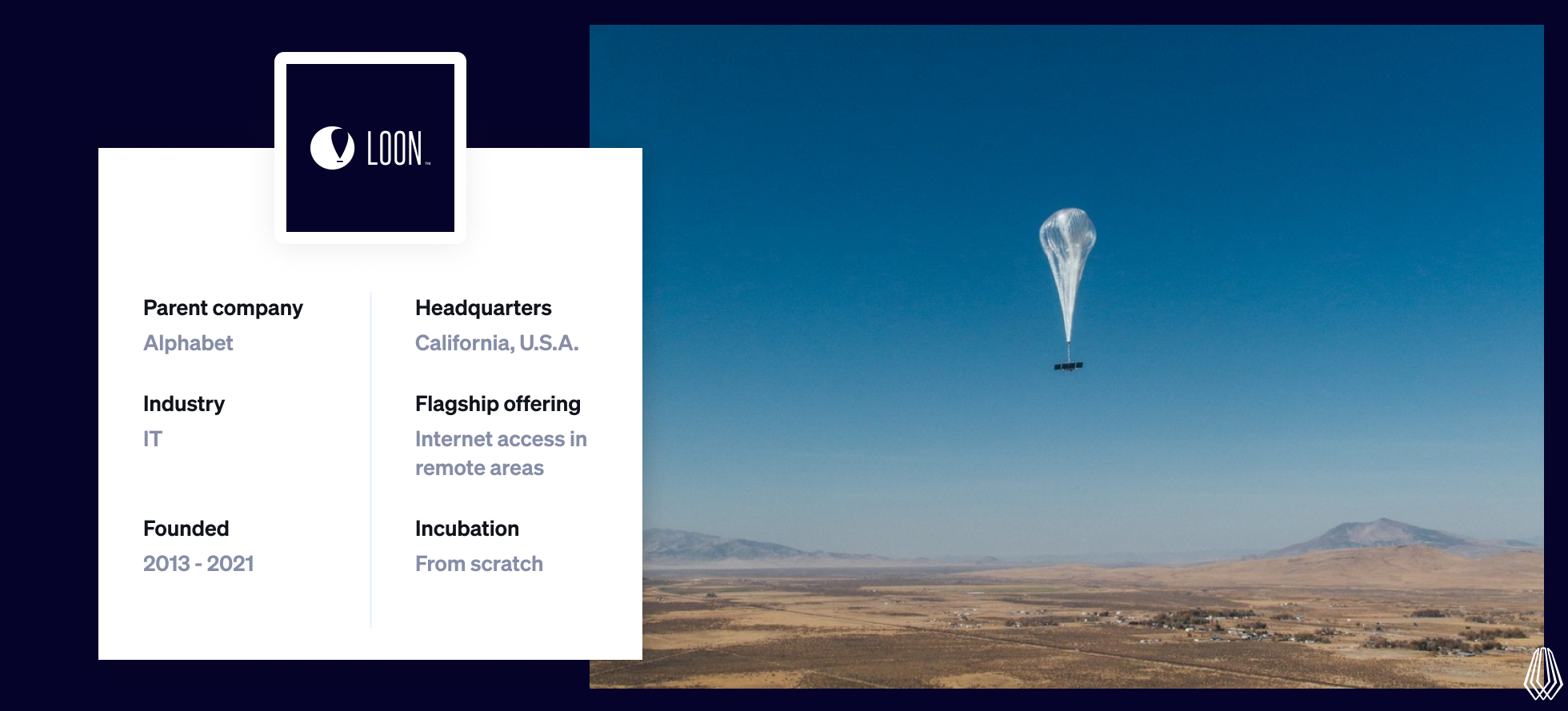
What was Loon, and why did it fail?
Loon took all the connectivity elements of a typical cell tower and put them into balloons that can be carried up to the Earth’s stratosphere. The goal was to create an entire network of balloons that would provide high-speed internet access to billions of people in remote areas.
It was shut down after failing to reach commercial viability.
Venture overview
Despite providing internet access during natural disasters in Puerto Rico and Peru and having its first commercial partners in Kenya, Alphabet has decided to wind down the company. Although most of the team will be moving on to other roles within X (Alphabet’s Moonshot Factory), Google and Alphabet, a small crew will remain in place to ensure that Loon’s last flight goes smoothly.
As explained on their website:
“...the road to commercial viability has proven much longer and riskier than hoped. So we’ve made the difficult decision to close down Loon. In the coming months, we’ll begin winding down operations.”
🚨Corporate venture lesson
Even moonshot technologies must have a viable commercial model to survive beyond pilot success.
Example 10. VYVE by BP
Founded: 2019
Shut down: 2023

What was VYVE, and why did it fail?
VYVE was a mobile app designed to help people understand, track, and reduce their carbon footprint. It was discontinued due to low engagement and unclear user retention.
Venture overview
VYVE enabled users to calculate their carbon footprint in real-time, regardless of the mode of transportation (e.g., car, flight, bus, train, etc.). The app also enabled users to buy “carbon offsets” by sponsoring different green initiatives worldwide.
It was just one of the ventures to come out of Launchpad, BP’s business builder, tasked with creating five unicorn companies by 2025.
🚨Corporate venture lesson
Purpose-driven tools must still deliver daily value and user engagement to thrive.
Can corporate venture failure still deliver value?
Yes. Even when a corporate venture fails, it can provide valuable insights that improve future innovation efforts. By using lean experimentation techniques, companies can minimise losses and “fail forward.” This entails using failure as a tool for learning, leading to better decisions: whether to iterate, pivot, or kill the idea.
Here are some examples of corporate venture lessons gained from failure:
- Store°8 plans to use many of its Jet Black learnings to improve other Walmart services like InHome.
- Loon’s team will take the skills and know-how they gained, creating their unique technology to other areas of the company, including X, Google and Alphabet.
- The Nike Adventure Club team can go on to lead new and improved D2C ventures within Nike.
FAQs about failed ventures
Q. Why should corporate innovators study failed ventures?
Understanding failed corporate ventures helps executives make better innovation bets. These case studies reveal blind spots in strategy, execution, and scaling, reducing future risk and improving portfolio performance.
Q. What are the most common reasons corporate ventures fail?
Most failures stem from a lack of customer validation, internal misalignment, slow decision-making, and poor scalability. Even with funding and brand equity, execution gaps can derail a venture.
Q. Can failure still be a strategic win?
Yes. When structured correctly, even failed ventures generate valuable IP, team experience, and customer insights that feed into future growth initiatives or internal improvements.
Q. What is “failing forward,” and why does it matter?
Failing forward is a lean innovation approach that utilises small, fast failures to gain validated learnings. It helps corporations reduce sunk costs, iterate faster, and build more resilient innovation pipelines.
Q. How can leadership reduce failure risk in new ventures?
By ensuring clear strategic alignment, setting milestone-based governance, validating early with customers, and empowering autonomous, cross-functional teams. Most importantly, by embracing failure as part of the innovation process, not as a sign of incompetence.
Final thoughts
Many inspiring corporate venturing success stories show how the technique can accelerate growth and create new revenue streams. Ventures like Disney+, Vipps and Hatch (to name a few) are enabling their parent companies to meet rapidly changing market trends and providing new business insights:
- Providing a broader understanding of customer pain points and preferences.
- Enabling companies to identify weak points in new business models and offerings.
- Facilitating out-of-the-box applications for new technologies.
- Acting as a springboard for the creation of future products and services.
We’ll leave you with this quote by Charles Kettering, famously known for inventing the ignition system for engines and having 189 patents: “99 percent of success is built on failure.”
---
Validation efforts can help businesses decrease risk, gather valuable customer feedback, and determine if a venture is commercially viable before investing too many resources. We can help you find the evidence and proof your corporate venture needs to move forward.
5 successful corporate startups examined.
We take a deep look into how 5 corporate startups found success.









